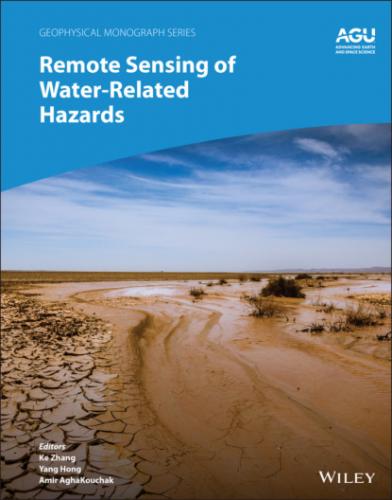LC record available at https://lccn.loc.gov/2021056639 LC ebook record available at https://lccn.loc.gov/2021056640
Cover Design: Wiley
Cover Image: © Amir AghaKouchak (@aghakouchak)
LIST OF CONTRIBUTORS
Amir AghaKouchak Department of Civil and Environmental Engineering University of California, Irvine California, USA
Howard B. Bluestein School of Meteorology University of Oklahoma Norman, Oklahoma, USA
Guoding Chen State Key Laboratory of Hydrology‐Water Resources and Hydraulic Engineering, and College of Hydrology and Water Resources Hohai University Nanjing, China
Mengye Chen Hydrology and Water Security Program School of Civil Engineering and Environmental Science University of Oklahoma Norman, Oklahoma, USA
Dennis L. Corwin United States Salinity Laboratory Agricultural Research Service United States Department of Agriculture Riverside, California, USA
Shang Gao Hydrology and Water Security Program School of Civil Engineering and Environmental Science University of Oklahoma Norman, Oklahoma, USA
Jonathan J. Gourley Hydrometeorology and Remote Sensing Laboratory School of Civil Engineering and Environmental Sciences University of Oklahoma and NOAA National Severe Storms Laboratoryand Cooperative Institute for Mesoscale Meteorological StudiesUniversity of OklahomaNorman, Oklahoma, USA
Emad Hasan Center for Space Research The University of Texas at Austin Austin, Texas, USA and Geology Department Faculty of ScienceDamietta University New Damietta, Egypt
Yang Hong Hydrometeorology and Remote Sensing LaboratorySchool of Civil Engineering and Environmental Sciences University of Oklahoma Norman, Oklahoma, USA and Advanced Radar Research Center, and Center for Spatial Analysis National Weather Center Norman, Oklahoma, USA
Kazuki Inoue Institute of Industrial Science University of Tokyo Tokyo, Japan
Zaw Myo Khaing State Key Laboratory of Hydrology‐Water Resources and Hydraulic Engineering, and Yangtze Institute for Conservation and Development, and College of Hydrology and Water Resources Hohai University Nanjing, China
Xin Li College of Hydrology and Water Resources Hohai University Nanjing, China
Yunping Li State Key Laboratory of Hydrology‐Water Resources and Hydraulic Engineering, and Yangtze Institute for Conservation and Development, and College of Hydrology and Water Resources Hohai University Nanjing, China
Zhi Li Hydrology and Water Security Program School of Civil Engineering and Environmental Science University of Oklahoma Norman, Oklahoma, USA
Zhijia Li College of Hydrology and Water Resources Hohai University Nanjing, China
Linxin Liu State Key Laboratory of Hydrology‐Water Resources and Hydraulic Engineering, and Yangtze Institute for Conservation and Development, and College of Hydrology and Water Resources Hohai University Nanjing, China
Wen Liu Graduate School of Engineering Chiba University Chiba, Japan
Meixia Lv Key Laboratory of Regional Climate–Environment for Temperate East Asia Institute of Atmospheric Physics Chinese Academy of Sciences Beijing, China
Feng Lyu Institute of Remote Sensing and Geographical Information Systems School of Earth and Space Sciences Peking University Beijing, China
Meihong Ma School of Geographic and Environmental Sciences Tianjin Normal University Tianjin, China
Zhuguo Ma Key Laboratory of Regional Climate–Environment for Temperate East Asia Institute of Atmospheric Physics Chinese Academy of Sciences Beijing, China and College of Earth and Planetary Sciences University of Chinese Academy of Sciences Beijing, China
Ziqiang Ma Institute of Remote Sensing and Geographical Information Systems School of Earth and Space Sciences Peking University Beijing, China
Elia Scudiero Department of Environmental Sciences University of California Riverside, California, USA
Guoqiang Tang Centre for Hydrology University of Saskatchewan Canmore, Alberta, Canada
Ran Tao State Key Laboratory of Hydrology‐Water Resources and Hydraulic Engineering andYangtze Institute for Conservation and Development, and College of Hydrology and Water Resources Hohai UniversityJoint Laboratory for Hydrometeorological Studies Hohai University Nanjing, China
Aondover Tarhule Department of Geography, Geology, and the Environment Illinois State University Normal, Illinois, USA
Humberto Vergara Hydrometeorology and Remote Sensing Laboratory School of Civil Engineering and Environmental Sciences, and Cooperative Institute for Mesoscale Meteorological Studies University of Oklahoma Norman, Oklahoma, USA and Advanced Radar Research Center, and Center for Spatial AnalysisNational Weather Center and NOAA National Severe Storms Laboratory Norman, Oklahoma, USA
Zhanming Wan Colaberry Inc. Creve Coeur, Missouri, USA and The Climate Corporation Dallas, Texas, USA
Sheng Wang State Key Laboratory of Hydrology‐Water Resources and Hydraulic Engineering, and Yangtze Institute for Conservation and Development, and College of Hydrology and Water Resources Hohai University Nanjing, China
Tsechun Wang Institute of Remote Sensing and Geographical Information Systems School of Earth and Space Sciences Peking University Beijing, China
Yi Xia State Key Laboratory of Hydrology‐Water Resources and Hydraulic Engineering, and College of Hydrology and Water Recourses Hohai University Nanjing, China
Wentao Xiong Institute of Remote Sensing and Geographical Information Systems School of Earth and Space Sciences Peking University Beijing, China
Xianwu Xue Systems Research GroupEnvironmental Modeling Center United States National Centers for Environmental PredictionCollege Park, Maryland, USA
Fumio Yamazaki National Research Institute for Earth Science and Disaster Resilience Ibaraki, Japan
Ke Zhang State Key Laboratory of Hydrology‐Water Resources and Hydraulic Engineering, and Yangtze Institute for Conservation and Development, and College of Hydrology and Water Resources, and CMA‐HHU Joint Laboratory for Hydrometeorological Studies Hohai University Nanjing, China
PREFACE
Water‐related hazards—including floods, droughts, rainfall‐triggered landslides, soil salinization—and their impacts have increased significantly in the past decades. This increase has spurred research into improving monitoring and prediction, understanding the underlying drivers, implementing various mitigation and adaptation strategies, and identifying interconnectivity with other factors such as climate change, population growth, exposure, and socioeconomic development. The detection, monitoring, and forecasting of water hazards is critical to develop adaptation and mitigation measures and to prevent natural hazards from becoming human disasters.
Progress in computational modeling and remote sensing technology has transformed the field beyond recognition in just two decades. The wealth of sensors currently in orbit include
